Data, multimedia, freedom of information requests, expert sources, developers, students and journalists.
With a focus on immigration in Colorado, they all came together at the end of September for Migrahack at the University of Denver (DU). Cosponsors included The Andrew W.Mellon Foundation, Open Media Foundation, Open the Government, and PEN America. (See full list here.)
The two-day event brought together some 200 people who collaborated on a range of projects aimed at answering questions about immigration in the state.
Here’s one example: a group of students from DU and University of Colorado Boulder worked with journalists from KUNC to describe the different route take to come to the United States. “This tool demonstrates just how difficult and constricted legal pathways for immigration have become in recent years,” writes KUNC’s Esther Rose Honig on Medium. The KUNC team enjoyed connecting with aspiring journalists and taking a “step out of the daily news cycle and look at the bigger picture of journalism about immigration.”
Erin McIntyre, the co-publisher of the Ouray Country Plaindealer was inspired by keynote speaker Los Angeles Times immigration reporter Cindy Carcamo. And McIntyre took away key lessons from a Freedom of Information Act workshop presented by Open the Government during Migrahack. She’ll use the practical tips she learned there – such as checking agency notices of what records they keep, to better craft requests; finding the staff person who handles FOIA requests and getting to know them; and identifying herself as a journalist when making requests, something she thought could hurt her chances but with FOIA often helps. Why does all this matter?
DU Media Professor Lynn Schofield Clark presents the Anvil of Freedom Award to LA Times immigration journalist Cindy Carcamo.
“The real key is finding the documents that prove what’s true, to get past all the various narratives, inflammatory language and debate. In the end, public documents help us anchor ourselves to reality as we’re inundated with pundits, Tweets and arguments over contentious issues,” writes McIntyre on Medium.
Beatriz A. Garcia, an immigrant who lives in Durango, found resources to communicate with others in her region via the recently created Noticias La Plata, which uses Instagram as a platform.
“Thanks to the tools that Migrahack instilled in us, Noticias La Plata is better positioned to serve its readership,” she writes on Medium. “And personally, after my experience at Migrahack, I see our mission in La Plata County as more important than ever.”
For every person who came to Migrahack Colorado, it seemed there was a story behind the story: what inspired them to come, why they stayed and worked, and what they learned. Here are a few more tales from the day.
Search #MigrahackCO on Twitter;
Read about Migrahack CO on Medium;
Visit the University of Denver’s Migrahack website.



